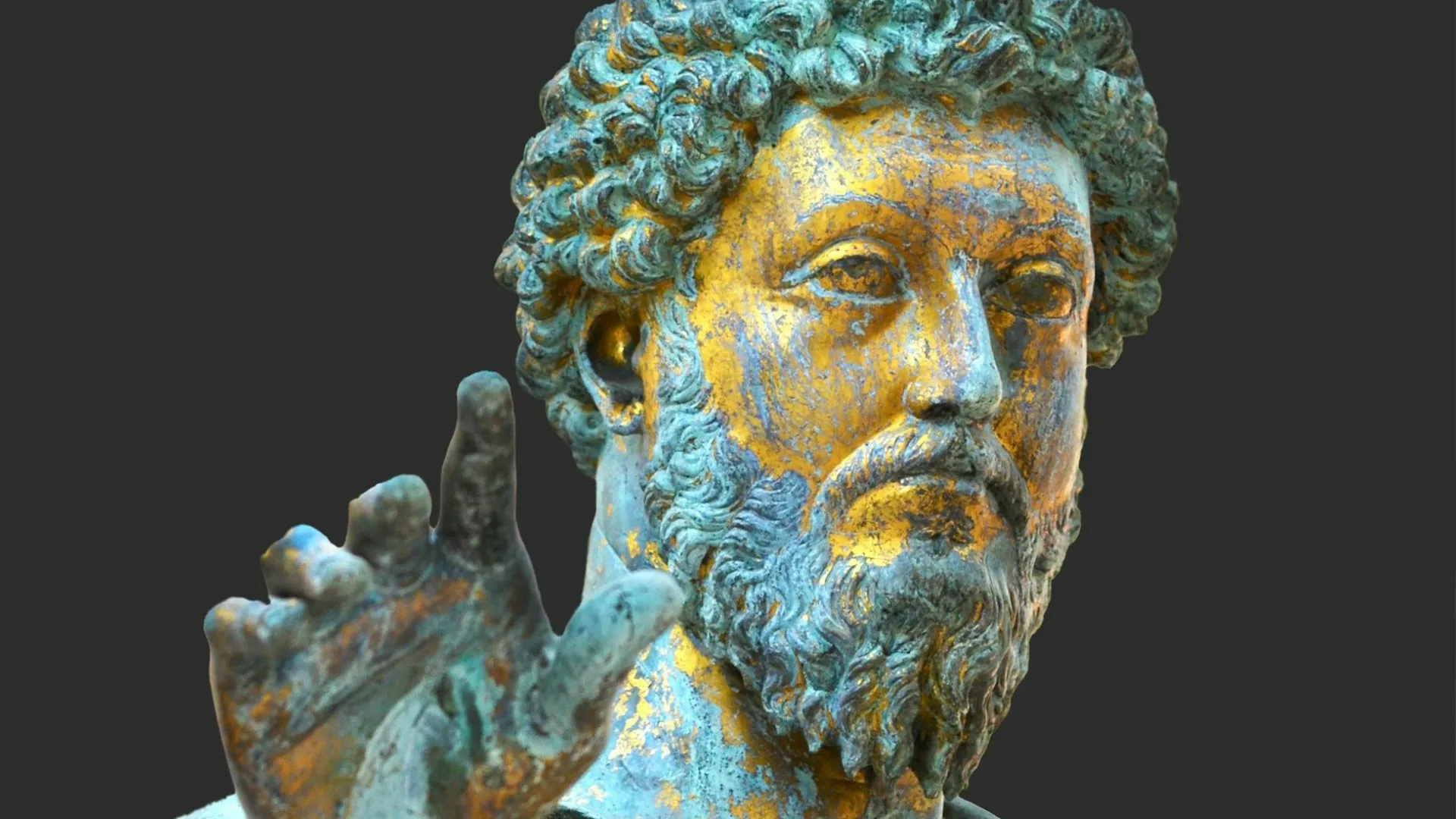Stoicism wisdom and the word Stoic originates from the Greek term “phronesis” (φρόνησις), meaning practical knowledge. This idea of virtue goes back to the teachings of Plato. It refers to the ability to achieve human happiness by knowing what is good and bad. It helps us make decisions about what we should and shouldn’t do. At the core of Stoicism is the practice of stepping back from emotional and physical chaos to find calm and clear thinking. This philosophy was famously practiced by Marcus Aurelius, a Roman emperor. Even though Stoicism began in ancient times, its ideas remain relevant today, according to cognitive behavioral therapist Donald Robertson.
Very little is needed to make a happy life; it is all within yourself, in your way of thinking.
Marcus Aurelius
Marcus Aurelius was emperor during the second century A.D. and encountered numerous challenges after a long era of peace. Right after taking the throne, he found himself in a war against the Parthians. He also faced invasions from northern groups, a famine, and the flooding of the River Tiber. On top of all that, he dealt with the Antonine Plague, which is thought to have claimed the lives of about five million people. In these difficult times, he turned to the Stoic philosophy he had studied in his youth for guidance. Luckily, we have access to his writings, which reveal how he dealt with these hardships and the mental strategies he applied from Stoic principles. More: How to stop the anxiety cycle?
The strength of stoicism wisdom: Marcus Aurelius and the power of control

We often hear about big issues in the world and events happening in other countries that we can’t control. The Stoics understood long ago that the key is to separate what we can control from what we cannot. In the end, the only thing we truly have control over is our own will and our actions. While many things happen to us, we can control how we respond to those events. Stoicism encourages us to take more responsibility for what we can do, both in our thoughts and actions, and to respond thoughtfully to the situations we encounter.
Cognitive behavioral psychotherapist Donald Robertson highlights this idea when he discusses Marcus Aurelius. Despite being frail and facing several health problems, Marcus outlived many of his contemporaries during a challenging time in Roman history. Many people fell victim to wars and plagues, yet Marcus reached nearly 50 years of age—a significant achievement given the harsh conditions of his era. His resilience shows that he had more strength than he seemed to possess. Historians believe this toughness came from the psychological strategies Marcus developed to cope with his emotions and manage the physical pain he experienced. His ability to apply Stoic principles likely helped him navigate the difficulties of leadership during such a turbulent period, demonstrating the power of focusing on what we can control. More: Which plants promote relaxation?
Understanding anger through stoicism
Anger is a common emotion that the Stoics focused on a lot. They considered it one of the main emotions that causes problems. Seneca, a Stoic philosopher, wrote a book called On Anger that explores how to manage this emotion. Marcus Aurelius also paid close attention to anger, especially in his youth. At the beginning of his book, he admits to struggling with his feelings of anger.
Meditations serves as a guide for Marcus as he learns to handle his anger and become more understanding of others. He shares many techniques that remain relevant today and align with modern therapy practices. At one point, he even lists ten specific Stoic techniques to help manage anger, showing how timeless these strategies are. More: Emotions as teachers: What can we learn from them?


And what does stoicism wisdom teach about enjoyment?
Marcus Aurelius, like other Stoics, understood that some positive feelings, such as happiness, can be risky. The Greeks were well aware of this idea. When we get too swept up in pleasure, we may make poor decisions. It’s essential to stay alert and maintain control, even when things are enjoyable. Happiness can sometimes lead us to act in ways we might regret later.
Marcus aimed to appreciate life and find genuine joy, but he wanted to do so in a healthy manner. He emphasized the importance of considering the consequences of our desires. For Stoics, it’s vital to think about how our actions will affect us in the long run. We should ask ourselves if our desires make sense and if they truly contribute to our well-being, or if indulging in them might harm us.
In today’s society, many people often discuss their frequent use of the internet and social media. This is a common topic. Stoicism teaches us to take a step back from our feelings and not just react to them. It encourages us to adopt a broader perspective and evaluate whether our actions are beneficial. We need to learn to set boundaries on behaviors that might feel enjoyable but aren’t good for us over time. More: How to stop repeating the same mistake and learn from it?
Stoicism wisdom can help you face all life challenges
Stoicism offers valuable wisdom that can help you become less reactive to negative events by encouraging a mindset focused on what you can control. Just as Marcus Aurelius faced immense challenges during his reign—wars, plagues, and natural disasters—he leaned on Stoic principles to navigate adversity.
This philosophy teaches us to differentiate between what lies within our control and what does not, allowing us to respond thoughtfully rather than impulsively. In a world overflowing with information and external pressures, many people, particularly in high-stress environments like the tech industry, find themselves overwhelmed by worries beyond their reach. More: How to give and accept constructive criticism
By adopting a Stoic perspective, you can shift your focus from these uncontrollable factors to your own thoughts and actions. This shift empowers you to respond to challenges with clarity and resilience, ultimately reducing stress and fostering a healthier mindset. When you learn to frame situations in more objective terms, as the Stoics did, you can lessen the emotional impact of negative events and maintain a sense of inner calm amidst chaos. More: North node Scorpio, what you want and what you should avoid
Essential reads for exploring stoicism
If you’re interested in diving into the world of Stoicism, this curated list highlights essential books that range from accessible introductions to foundational texts by key Stoic philosophers.
- How to Be a Stoic by Massimo Pigliucci: This book serves as an accessible introduction to Stoicism, guiding readers through its core principles using engaging dialogues with the Stoic philosopher Epictetus.
- Cambridge Companion to the Stoics by Brad Inwood: This collection of essays provides a thorough critical analysis of Stoicism, exploring its history and central ideas through the lens of contemporary scholarship.
- How to Live a Good Life (According to 7 of the World’s Wisest Philosophies) by Philosophy Break: This concise guide compares Stoicism with six other philosophical traditions, providing key insights and ethical frameworks.
- Discourses and Selected Writings by Epictetus: Compiled by his student Arrian, this collection showcases the practical wisdom of Epictetus, a former slave and Stoic teacher.
- Letters from a Stoic by Seneca: This collection of letters reflects Seneca’s thoughts on Stoic philosophy while sharing insights from his tumultuous life.
- Meditations by Marcus Aurelius: Written as personal reflections rather than intended for publication, this work offers profound insights into coping with hardship and maintaining tranquility. More: 6 ways how to stop procrastinating










